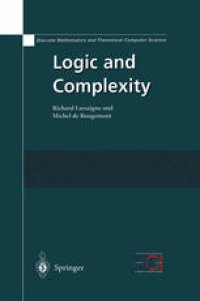
Ebook: Logic and Complexity
- Tags: Discrete Mathematics in Computer Science, Probability Theory and Stochastic Processes, Calculus of Variations and Optimal Control, Optimization, Logics and Meanings of Programs
- Series: Discrete Mathematics and Theoretical Computer Science
- Year: 2004
- Publisher: Springer-Verlag London
- Edition: 1
- Language: English
- pdf
Logic and Complexity looks at basic logic as it is used in Computer Science, and provides students with a logical approach to Complexity theory. With plenty of exercises, this book presents classical notions of mathematical logic, such as decidability, completeness and incompleteness, as well as new ideas brought by complexity theory such as NP-completeness, randomness and approximations, providing a better understanding for efficient algorithmic solutions to problems.
Divided into three parts, it covers:
- Model Theory and Recursive Functions - introducing the basic model theory of propositional, 1st order, inductive definitions and 2nd order logic. Recursive functions, Turing computability and decidability are also examined.
- Descriptive Complexity - looking at the relationship between definitions of problems, queries, properties of programs and their computational complexity.
- Approximation - explaining how some optimization problems and counting problems can be approximated according to their logical form.
Logic is important in Computer Science, particularly for verification problems and database query languages such as SQL. Students and researchers in this field will find this book of great interest.
Logic and Complexity looks at basic logic as it is used in Computer Science, and provides students with a logical approach to Complexity theory. With plenty of exercises, this book presents classical notions of mathematical logic, such as decidability, completeness and incompleteness, as well as new ideas brought by complexity theory such as NP-completeness, randomness and approximations, providing a better understanding for efficient algorithmic solutions to problems.
Divided into three parts, it covers:
- Model Theory and Recursive Functions - introducing the basic model theory of propositional, 1st order, inductive definitions and 2nd order logic. Recursive functions, Turing computability and decidability are also examined.
- Descriptive Complexity - looking at the relationship between definitions of problems, queries, properties of programs and their computational complexity.
- Approximation - explaining how some optimization problems and counting problems can be approximated according to their logical form.
Logic is important in Computer Science, particularly for verification problems and database query languages such as SQL. Students and researchers in this field will find this book of great interest.
Logic and Complexity looks at basic logic as it is used in Computer Science, and provides students with a logical approach to Complexity theory. With plenty of exercises, this book presents classical notions of mathematical logic, such as decidability, completeness and incompleteness, as well as new ideas brought by complexity theory such as NP-completeness, randomness and approximations, providing a better understanding for efficient algorithmic solutions to problems.
Divided into three parts, it covers:
- Model Theory and Recursive Functions - introducing the basic model theory of propositional, 1st order, inductive definitions and 2nd order logic. Recursive functions, Turing computability and decidability are also examined.
- Descriptive Complexity - looking at the relationship between definitions of problems, queries, properties of programs and their computational complexity.
- Approximation - explaining how some optimization problems and counting problems can be approximated according to their logical form.
Logic is important in Computer Science, particularly for verification problems and database query languages such as SQL. Students and researchers in this field will find this book of great interest.
Content:
Front Matter....Pages i-x
Introduction....Pages 1-2
Front Matter....Pages 3-3
Propositional logic....Pages 5-23
Deduction systems....Pages 25-39
First-order logic....Pages 41-55
Completeness of first order logic....Pages 57-66
Models of computation....Pages 67-82
Recursion and decidability....Pages 83-108
Incompleteness of Peano arithmetic....Pages 109-128
Front Matter....Pages 129-129
Complexity: time and space....Pages 131-150
First-order definability....Pages 151-174
Inductive definitions and second-order logic....Pages 175-190
Time complexity: the classes P and NP....Pages 191-212
Models of parallel computations....Pages 213-227
Space complexity: the classes L, FL, NL and PSPACE....Pages 229-250
Definability of optimization and counting problems....Pages 251-262
Front Matter....Pages 263-263
Probabilistic Classes....Pages 265-277
Probabilistic verification....Pages 279-298
Approximation....Pages 299-321
Classes beyond NP....Pages 323-342
Back Matter....Pages 343-361
Logic and Complexity looks at basic logic as it is used in Computer Science, and provides students with a logical approach to Complexity theory. With plenty of exercises, this book presents classical notions of mathematical logic, such as decidability, completeness and incompleteness, as well as new ideas brought by complexity theory such as NP-completeness, randomness and approximations, providing a better understanding for efficient algorithmic solutions to problems.
Divided into three parts, it covers:
- Model Theory and Recursive Functions - introducing the basic model theory of propositional, 1st order, inductive definitions and 2nd order logic. Recursive functions, Turing computability and decidability are also examined.
- Descriptive Complexity - looking at the relationship between definitions of problems, queries, properties of programs and their computational complexity.
- Approximation - explaining how some optimization problems and counting problems can be approximated according to their logical form.
Logic is important in Computer Science, particularly for verification problems and database query languages such as SQL. Students and researchers in this field will find this book of great interest.
Content:
Front Matter....Pages i-x
Introduction....Pages 1-2
Front Matter....Pages 3-3
Propositional logic....Pages 5-23
Deduction systems....Pages 25-39
First-order logic....Pages 41-55
Completeness of first order logic....Pages 57-66
Models of computation....Pages 67-82
Recursion and decidability....Pages 83-108
Incompleteness of Peano arithmetic....Pages 109-128
Front Matter....Pages 129-129
Complexity: time and space....Pages 131-150
First-order definability....Pages 151-174
Inductive definitions and second-order logic....Pages 175-190
Time complexity: the classes P and NP....Pages 191-212
Models of parallel computations....Pages 213-227
Space complexity: the classes L, FL, NL and PSPACE....Pages 229-250
Definability of optimization and counting problems....Pages 251-262
Front Matter....Pages 263-263
Probabilistic Classes....Pages 265-277
Probabilistic verification....Pages 279-298
Approximation....Pages 299-321
Classes beyond NP....Pages 323-342
Back Matter....Pages 343-361
....